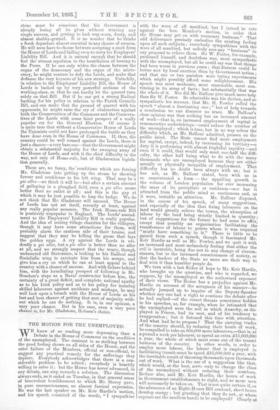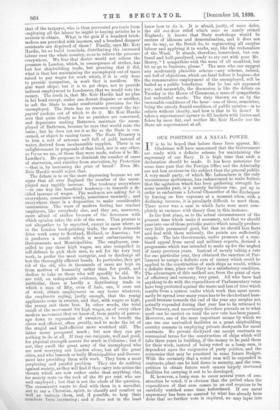THE MOTION FOR THE UNEMPLOYED.
WE know of no reading more depressing than a Debate in the House of Commons on the condition of the unemployed. The contrast is so striking between the good feeling shown on all sides of the House, and the utter failure of the Members, official or non-official, to suggest any practical remedy for the sufferings they deplore. Everybody acknowledges that there is a con- siderable problem to be solved ; everybody is heartily willing to solve it ; but the House has never advanced, in any debate, one step towards a solution. The discussion always ends, as it ended on Tuesday, in that general sense of benevolent bewilderment to which Mr. Storey gave, in pure unconsciousness, an almost farcical expression. He was the last speaker on Mr. Keir Hardie's motion, and his speech consisted of the words, "I sympathise with the woes of all mankind, but I intend to vote against the hon. Member's motion, in order that the House may get on with necessary business." That odd deliverance precisely embodies the existing feeling upon all such subjects ; everybody sympathises with the woes of all mankind, but nobody sees any "business" in any proposal to relieve them. Sir W. Foster, for example, professed himself, and doubtless was, most sympathetic with the unemployed, but all he could say was that things had been worse in previous years ; that distress could be better met by local exertion than by Government action; and that one or two parishes were trying experiments which might possibly afford some enlightenment. His speech was most moderate, most reasonable, most con- vincing in its array of facts ; but substantially that was the whole of it. Nor did Mr. Balfour give much more help than Sir W. Foster. So admirable was his diction, and so sympathetic his manner, that Mr. H. Fowler called the speech "almost a fascinating one ; " but of help towards a conclusion we can discover no trace. Mr. Balfour's clear opinion was that nothing but an increased amount of work—that is, an increased employment of capital in remunerative undertakings—could reduce the number of the unemployed ; which is true, but in no way solves the difficulty which, as Mr. Balfour admitted, presses on the . public mind. The State cannot find more employment for capital, except, indeed, by increasing its territory—a duty it is performing with almost frightful rapidity—and even if it could, that would only meet one-half the diffi- culty, the other half being what to do with the many thousands who are unemployed because they are either morally or physically incapable of employment. That difficulty has no doubt been always with us ; but it has not, as Mr. Balfour stated, been with us in so concentrated a form — the appalling growth in the volume of London population for ever increasing the mass of its precipitate or residuum—nor has it attracted from the public mind so continuous and, as it were, irritable an attention. Mr. Balfour disposed, in the course of his speech, of many suggestions, and especially of the idea that fixing labourers on the land would greatly relieve the towns, the absorption of labour by the land being strictly limited in quantity ; but of suggestions for the future he had none to offer, except that possibly an organisation facilitating the transference of labour to points where it was required "might have something in it." There is little to be gained from such a speech, though it fascinated Mr. Keir Hardie as well as Mr. Fowler, and we quit it with an increased and most melancholy feeling that either the evil is incurable, being due not to any change of circum- stances, but to the increased consciousness of society, or that the leaders of the State no more see their way to deal with it than humbler people do. We turn with a last flicker of hope to Mr. Keir Hardie, who brought up the question, and who is regarded, we suppose, by the unemployed as the authorised exponent of their views. The House has a prejudice against Mr. Hardie on account of the arrogance of his manner—he actually jumped up to inquire of the Deputy-Speaker whether any one had a right to continue the debate after he had replied—of the covert threats sometimes hidden. in his speeches, as, for example, when he intimated that the unemployed were the soil in which Anarchy, as dis- played in France, had its root, and of his tendency to exaggeration ; but it listened this time with attention. And what had he to propose ? That the carrying trades of the country should, by reducing their hours of work, be compelled to take on 300,000 more labourers,—that is, at a pound a week per labourer, to spend an extra £15,000,000 a year, the whole of which must come out of the transit business of the country. In other words, in order to employ more labour, the labour that is employed in facilitating transit must be taxed £15,000,000 a year, with the inevitable result of throwing thousands upon thousands out of work. What is the use of a suggestion like that, which would, at the best, serve only to change the class of the unemployed without reducing their numbers. Reduce also, said Mr. Keir Hardie, the hours of work in Government establishments to eight, and so more men will necessarily be taken on. That is not quite certain if, as the advocates of an Eight-Hours Bill contend, short hours develop energy ; but granting that they do not, at whose expense are the needless hands to be employed? Clearly at that of the taxpayer, who is thus prevented pro lotto from employing all the labour he might in buying articles he is anxious to obtain. What is the gain if a hundred brick- makers are provided with incomes, and a hundred drapers' assistants are deprived of them ? Finally, says Mr. Keir Hardie, let us build ironclad's, distributing the increased labour over the whole country, so as to relieve the pressure everywhere. We fear that device would not relieve the pressure in London, which, in consequence of strikes, has lost her shipbuilding trade, but granting that it did, what is that but maintaining the unemployed out of taxes raised to pay wages for work which, if it is only done to provide occupation, is work that is needless. We also want ships ; but it is to get ships, not to provide indirect employment to Londoners, that we would vote the money. The truth is, that Mr. Keir Hardie had no plan in his head except, under one decent disguise or another, to ask the State to make comfortable provision for the unemployed. The State has no resource except the tax- payers' pockets out of which to do it. Mr. Keir Hardie sees that quite clearly as far as parishes are concerned, and deprecates making Battersea maintain the unem- ployed of Battersea, because he says that would raise the rates ; but he does not see it as far as the State is con- cerned, or object to raising taxes. The State Treasury is to him a sort of artesian well full of gold, instead of water, derived from inexhaustible supplies. There is no enlightenment in proposals of that kind, nor in any other, so fez as we see, of those that were made, unless it be Mr. Lowther's. He proposes to diminish the number of cases of starvation, and suicides from starvation, by Protection —that is, by increasing the price of bread Even Mr. Keir Hardie would reject that. The debate is to us the more depressing because we see signs that all over England the number of the unem- ployed may rapidly increase. The tendency everywhere —in one way the beneficial tendency—is towards a de- cided increase of wages. The workmen are asking for it everywhere, sometimes wisely, sometimes unwisely ; and everywhere there is a disposition to make considerable concessions. The wave of modern feeling has reached employers, like everybody else, and they are, moreover, more afraid of strikes because of the fierceness with which opinion takes the side of the men. That process is not altogether to be regretted, except in cases where, as in the London book-printing trade, the men's demands drive work away to Scotland, Holland, or America ; but it produces a result which is most embarrassing to Governments and Municipalities. The employers, com- pelled to pay these high wages, are also compelled in self-defence to pick their men, to ask for the very best work, to prefer the most energetic, and to discharge all but the therougbly efficient hands. In particular, they get tid of the old, who in thousands of cases are kept on from motives of humanity rather than for profit, and. decline to take on those who will speedily be old. We are told, on indisputable evidence, that, in London in particular, there is hardly a distributing trade in which a man of fifty, even if hale, can, if once out of work, obtain employment on any terms whatever, the employers saying, justly enough, that the young 'applicants come in swarms, and that, with wages so high, the young suit them best. In other words, the total result of the movement for high wages, as of every other modern movement that we know of, from purity of patron- age down to repression of sweaters, is to benefit the clever and efficient, often greatly, and to make the lot of the stupid and half-efficient more wretched still. The latter never prospered much; but now they can get nothing to do at all. If they can emigrate, well and good, for physical strength counts for much in.Colonies ; but if not, they swell the great army of the unemployed who are now worrying not London alone, but all the great .cities, and who beseech or bully Municipalities and Govern- ment into providing them with work. They form a most perplexing and painful problem. They can do nothing against society, as they will find if they carry into action the threats which are now rather oaths than anything else, for society rests on the rock of the 80 per cent. who are well employed ; but that is not the whole of the question. The community wants to deal with them in a merciful, not to say a Christian, spirit, to classify and comfort as well as restrain them, and, if possible, to keep their numbers from increasing ; and it does not in the least know how to do it. It is afraid, justly, of mere doles, the old out-door relief which once so nearly ruined England ; it knows that State workshops would be centres of idleness and demoralisation, and it does not see its way, as the Dutch du, to regimenting all surplus labour and applying it to works, say, like the reclamation of the Wash. It stands, therefore, benevolent, but con- fused and half-paralysed, ready to cry out with poor Mr. Storey, " I sympathise with the woes of all mankind, but let us go to business, please." The man who can suggest any moderately plausible scheme—any scheme, indeed, not full of objections, which are fatal before it begins—for the remunerative employment of the unemployed, will be hailed as a public benefactor. But he has not appeared yet ; and meanwhile, the discussion is like the debate on Tuesday in the House of Commons, a mass of sympathetic but unfruitful words. The duty thrown on us by the inexorable conditions of the hour—one of these, remember, being the utterly flaccid condition of public opinion—is to relieve without charity, and how is that to be done ? It takes a supernatural agency to fill baskets with loaves and fishes by mere fiat, and neither Mr. Keir Hardie nor the State are supernatural at all.











































 Previous page
Previous page